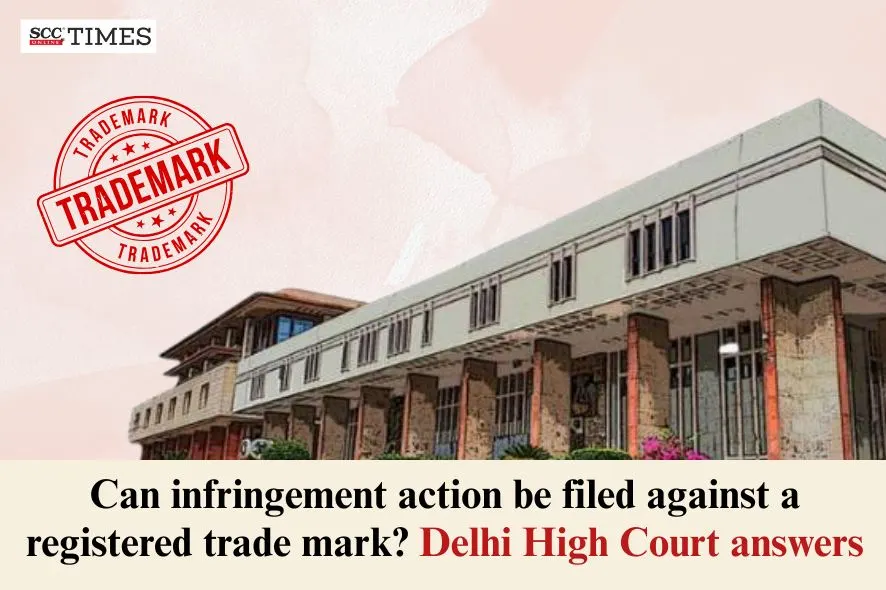Delhi High Court: In an appeal against a commercial Court order, wherein the Court had granted an injunction restraining the appellants from using their registered trade mark ‘VAIDYA RISHI’, the Division Bench of C. Hari Shankar* and Om Prakash Shukla, JJ, held that no action for infringement can lie against a proprietor of a registered trade mark. Thus, the Court set aside the order of injunction against the appellants.
Background
The appellant is the registered proprietor of the trade mark ‘VAIDYA RISHI’ and has been using the same since 1972. The respondent is the registered proprietor of the trade mark ‘VAIDRISHI’. The respondent had instituted a suit for injunction claiming infringement of its registered mark. The commercial Court vide the impugned judgment had granted the injunction in favour of the respondent on the ground that the respondents were the prior user of the mark. However, the commercial Court had not discussed the aspect of passing off and had passed the order for interim injunction solely on the ground of infringement.
The question for deliberation before the Court was whether a suit for injunction would lie against the proprietor of a registered trade mark.
Analysis, Law and Decision
The Court noted that the commercial Court had relied on the case of Raj Kumar Prasad v. Abbott Healthcare (P) Ltd., (2014) 60 PTC 51 (‘Raj Kumar Prasad case’) wherein the Court had held that where the Court finds infringement of a trade mark, a suit for injunction can lie against even a proprietor of a registered trade mark.
The Court explained in detail the sections under Trade Marks Act, 1999 (‘the Act’) governing infringement of trade mark.
The Court noted that the definition of infringement under Section 29 of the Act envisages infringement only by a person who is not a registered proprietor of the mark or a person using the mark as a permissive user. Each sub-section starts with the words
“A registered trade mark is infringed by a person who, not being a registered proprietor or a person using by way of permitted use …”
As such, per definition, there can be no infringement by a registered user of a mark in the classes in which it is registered in his favour.
The Court further noted that Section 30(2)(e) of the Act sets out various circumstances that don’t qualify as ‘infringement’ and one such circumstance is the use of a trade mark by its registered proprietor. The Court stated that since the registration of the trade mark confers absolute right to use it, the use of the trade mark by its proprietor can never be infringement.
Furthermore, the Court observed that Section 28(3) deals with a situation where two persons may be registered proprietors of marks that may be similar to each other. The Section provides that in such cases, neither person would be allowed to interfere with the exclusive right of the other person to use the mark.
The Court also noted that through the case of S. Sayed Mohideen v. P. Sulochana Bai, (2016) 2 SCC 683, the Supreme Court had clarified that there could be no infringement action against the proprietor of a registered trade mark and that no injunction can be granted against use, by the proprietor of a registered trade mark, of the mark in the class in which it is registered in his favour, on the ground of infringement.
The Court further opined that that an action of passing off could still be claimed against a proprietor of a registered trade mark since Section 27(2) of the Act expressly saves passing off actions.
Thus, the Court held that the commercial Court had erred in granting an injunction against the appellant on the ground of infringement. Further the Court restrained the appellant from using the VAIDYA RISHI mark for any goods or services in case not covered by the Classes in whih it is registered but which are covered by the registrations held by the respondent for the mark VAIDRISHI.
Accordingly, the Court set aside the impugned judgment of the commercial Court.
[Vaidya Rishi India Health Pvt. Ltd. v. Suresh Dutt Parashar, 2025 SCC OnLine Del 6147, decided on 7-8-2025]
*Judgment authored by: Justice C. Hari Shankar
Advocates who appeared in this case:
For the Appellant: Tarun Sharma, Tushar Datta, Advocates
For the Respondent: Sumit Nagpal, Kamna S. Nagpal, Aakanksha Singh, Advocates


